
Discovery’s Final End Is a Work in Progress
What a long road it’s been for Star Trek: Discovery, getting from there to here. Along that road it’s certainly had its ups and downs, but for all its faults, it’s been hard to deny in this last season that the series is assured in what its ultimate message was always going to be. So even knowing that, it’s perhaps fitting that its farewell is delivered in a manner as much as the whole show has been these past seven years: a little muddled, a lot of emotional earnesty, and an unsubtle, steadfast faith in one single idea.

“Life, Itself” has a lot on its shoulders, not just as a finale to Star Trek: Discovery and the duty it needs to do to these characters, but as a finale to the series that relaunched Star Trek at large in a time no one was certain we’d be getting any more of it after Enterprise had come to an end. We have had endings since Discovery kicked off this era, of course—and more will come. But there is still something about the weight of the show that started it all entering its final hour (well, hour and a half, but who’s counting?). What does Star Trek: Discovery have left to say? What is it about? What is the point that this all led up to?
The answer is, perhaps, perfectly Discovery, in that it takes an occasionally awkward and tortured roundabout way to get to an idea it has long held clear in its heart: “Life, Itself” is a bizarrely paced episode of television, one that struggles to balance three plot threads set up by last week’s excellent Breen heist. The first, of course, is Michael and Moll, who have jumped into the portal to the Progenitor technology’s location in an attempt to claim its power before the other can. Then, there’s Discovery and her crew, who find themselves in unassailable odds against the Breen destroyer and its fighters, buying time for Book (and Dr. Culber, who demands to be taken along because this is the finale dammit, and he needs to have something to do) to take a shuttle to the portal and drag it into Federation possession. And then there’s Saru, who once again, feels like he has to be here because the show realized it’s the last episode of the series and one of the show’s best-explored characters should at least play a part in it—but is ostensibly here to diplomatically intervene and stop even more rival Breen forces from showing up and turning an already messy situation into all-out war.
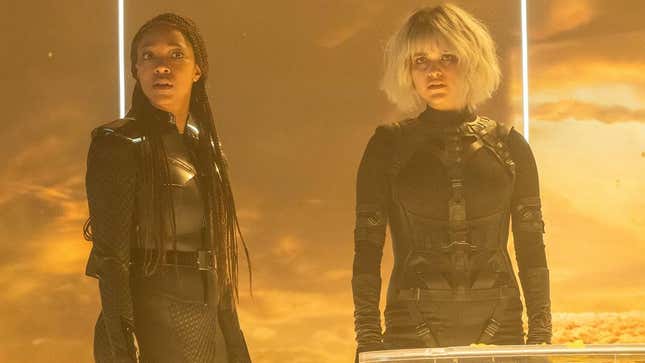
It’s both a lot and also not a lot. Cutting between the action inside the portal, out of it, and then back in warp with Saru all just feels like Discovery milling about with time it is increasingly running out of, dragging things out because it knows this is a finale episode and there needs to be a bit of action and crisis—but its heart isn’t in it at all, it wants to get to the moment it can make its ultimate thesis. So you have to sit through Michael telling Moll they should work together to navigate the topsy-turvy geometry of the Progenitor lab, only for Michael to start a brawl between them bouncing up and down walls and through portals for what feels like 10 minutes while yelling “we don’t have to do this, we can work together!” as if she had not started the fight. You have to sit through the awkwardness of Culber trying to justify his place on the shuttle with Book, clumsily navigating his arc this season about touching on faith as a man of science, only for it to fall apart when he’s really on the shuttle to be a plot device and conveniently remember a latent Trill memory that lets Book stabilize a tractor beam. The Saru stuff, at least, is enjoyable, because Doug Jones has barely been in the season and it’s fun to see him stand up to the Breen, as a nice coda to the Federation’s strong defiance of their strongarm tactics in “Erigah”.
But it still feels like Discovery twiddling its thumbs away from the dramatic meat of this story we’ve been building up to all season: our heroes finally have found this almighty technology, capable of creating and seeding new life, a power unlike anything in Star Trek. An idea so potent, and world-changing, the franchise left it alone for decades before it dared to pick it up again here in Discovery. What does it mean to offer that power to someone? We stand on the precipice of finding out when Michael—after a brief, failed attempt by Moll to decipher one last clue—cracks the code, and finds herself face to face with a Progenitor (Somkele Iyamah-Idhalama), who reveals that the technology and the path to find it has been orchestrated by beings even beyond them, and that this test was all to find a singular person who can go even further than the Progenitors did in establishing diverse life across the known galaxy.
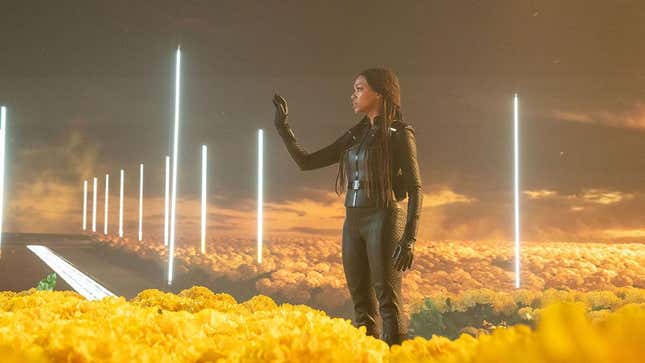
Can Michael Burnham be the person to do that? No, she balks, in awe of her surroundings at the heart of this beautiful, almighty cradle of creation, but also, because at last, Discovery is ready to make its final point: the point it has been making all season long. The galaxy as it stands right now doesn’t need more new life—only new, not remade, as we learn, essentially dumping Moll’s dramatic arc to the wayside—because, as the Progenitors set out to do, it is filled with diversity in infinite combinations. And it still needs work, thousands and thousands of years on, thousands and thousands of years into the process of Star Trek’s idealistic view of the future. There cannot be more life added and seeded, because it implies what is there in the here and now has achieved the apex of harmony and peace—and it hasn’t. The problem with Star Trek’s utopia is that, by its nature as a TV franchise written in the last nearly 60 years of human history, it is a utopia shaped by and for our contemporary lens: it’s aspirational, it’s a post-scarcity society where humanity and thousands upon thousands of species are traveling the stars together and interacting. But it’s also one made for a drama, and that drama is driven by social and personal conflict. War still exists. These ideals are still challenged and debated and fought over. The diversity and kernel of harmony in it the Progenitors hoped for, having been alone in the cosmos in their time, is here, but it has to be protected, and valued, and advanced, constantly, in order to keep it flourishing. It doesn’t just exist and the job’s done. Nothing is that perfect.
And no one person is that perfect, either, as Michael argues to the Progenitor. She followed the clue trail, sure, and yes, she believes in these ideals the Progenitors also valued: but she is one person, a flawed person at that (I mean, we did just see her start a fight with the only person who could help her get out of this giant floating portal-lab eventually, for no real reason other than she had the time to kill!). Offering the power of this life-creating arena to one person is a flawed concept, Michael argues, because people are always having to learn to be better, to strive to connect with each other, herself included. There is no reward for having achieved perfection, especially because she and the universe at large aren’t there yet. They might never be. But they have to keep working at it, and that work is worthy in and of itself without throwing almighty power at people along the way.
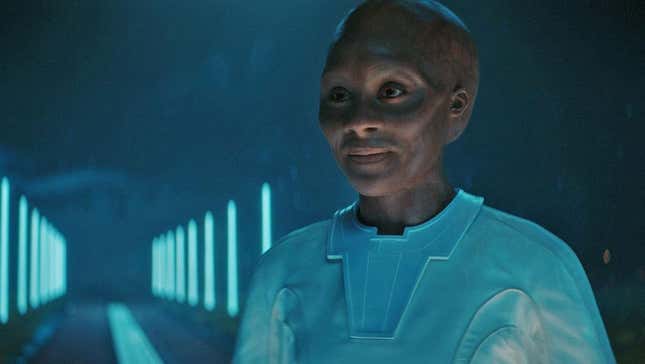
It’s messily set up, but it is the aspect of “Life, Itself” that really, really works. Discovery could’ve just hammered home that it has this ideal that people are better in unity, when they cross boundaries of species and circumstance to strive forward together, and left it at that. But Michael’s ultimate decision to destroy the technology—in the hope that whatever power beyond even the Progenitors could still be out there to rebuild it whenever the time comes—speaks to the idea that what Star Trek has now, in this moment, is an unyielding and unwavering progress that has to be worked on, not handwaved by deus ex machina. They can’t accept being patted on the back by the Progenitors for solving their clues all season long; they have to keep working for these ideals they cherish, that Star Trek itself cherishes: ideals that must constantly be challenged, and proved, and grown.
However, this thematic climax is achieved at the hour mark of an hour-and-a-half long episode. So somewhat ironically, Star Trek: Discovery still has to keep going, and this is where “Life, Itself” gets a bit messy. Having achieved this emotional thematic catharsis, the whole saga of the Progenitor tech is cleared up with a wild speed: Michael decides to destroy it, Stamets grumbles slightly, it’s chucked into a black hole, zip-zap-zop the entire season-long arc is over in a few minutes. The Breen fleet? Also zip-zap-zopped, almost literally, when Discovery pulls out a handwave from nowhere that it can split its saucer and body sections and use them as poles to create a spore-drive teleport for whatever’s between them, punting the Breen cruiser to the edge of the galaxy for a very, very long trip home. Moll is remanded into Federation custody, and is kind of just okay with the whole thing, even with the fact she couldn’t bring L’ak back because the dramatic thrust of the season is now over in an instant.
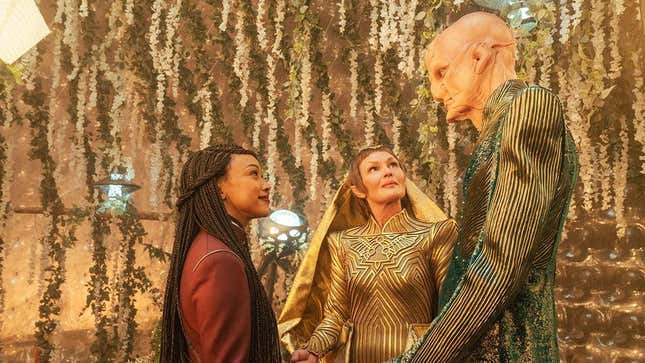
It gives way to something sweet, at least, and a lighter note to end the show on: Saru and T’Rina’s wedding at a lavish beachside little outpost. It ties in nicely to what Michael was saying about cherishing the good in the diverse connections we have; an inter-species wedding for a Vulcan society that traditionally looks down upon that sort of thing getting to be what Discovery goes out on is a nice symbol, as is the way it ties into Book and Michael themselves reconnecting after a season of navigating their lingering feelings for each other. The goodbye to the wider Discovery cast here is not quite so well done—just little nods at the after party, awkwardly stepping around the fact that the show replaced half of its barely explored bridge crew this season out of nowhere with similarly barely explored stand-ins—but at least there’s a nice coda for Tilly and Rayner, two standouts of the season, to get a rewarding farewell (and perhaps, even, set the stage for a Starfleet Academy appearance).
But even this is not the end, arguably as much as it should be. In a move that is perhaps perfectly indicative of Discovery’s messy nature, this epilogue has its own epilogue, and it’s simultaneously a beautiful note to end the show on while also being delivered in as unhinged a manner as possible. We fade back in on a flash-forward: an older Michael, now an Admiral, living a semi-retired life with Book on an alien homestead, a home beyond her life in Starfleet. She’s given one last mission, with the help of her son, the newly promoted Captain Leto Burnham (Sawandi Wilson), to go take Discovery, un-retrofitted back to its original 23rd century form save for Zora the advanced intelligent computer, out to be dumped in space on a mysterious mission from Agent Kovich—who I guess we should note, in an equally wild and out-of-nowhere moment, is revealed to actually be Temporal Agent Daniels from Star Trek: Enterprise, just for explanation’s sake of what his weird deal is—with only a single word to go on: craft.
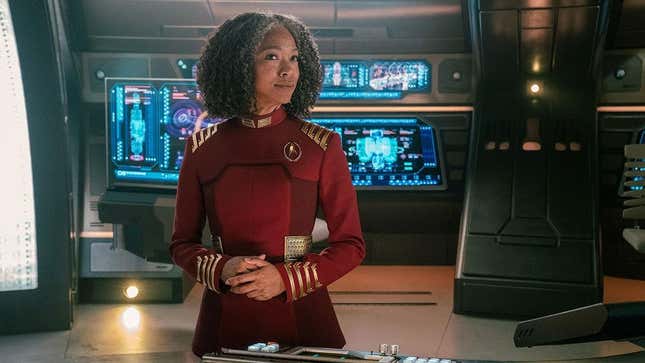
It turns out what Discovery is ending on, its final moments (well, more like final 20 minutes, somehow—again, a very weirdly paced episode!), is in fact a canonical justification for “Calypso”, the Star Trek: Short Treks minisode from 2018 that saw, thousands of years in the future, a lost soldier named Craft (played by Aldis Hodge) come across the abandoned Discovery and develop a connection to Zora. On the one hand, thematically it’s a lovely note. “Calypso,” if you don’t remember—and frankly, few people watching this finale may have even watched it at all, given that it was released six years ago, initially only in the U.S., and made difficult to find on international and home releases—was all about Zora and Craft’s connection pushing the soldier to have the hope to go back and find his family, having been saved from the doom to wander in perpetuity by coming across the abandoned Discovery. Craft was a soldier, his time, thousands of years after the events of this episode, was still one where conflict and struggle among peoples existed—the work that Michael argued was so worth it to the Progenitor, to keep defending and safeguarding Star Trek’s utopia, was still continuing. Making her final mission, Discovery’s final mission, be to set up the process for that to happen—even explaining away that “Calypso” found the original Discovery and not its 32nd century refit, because that minisode was shot between seasons one and two—and to keep championing this need to connect with other people, is quite touching.
But it’s also insane! The episode, which already suffered from wild pacing even with an extended runtime, dedicates its final act to explaining the plot contrivances from a short released over half a decade prior. More time than it spent wrapping up the central plot of its entire last season! More time than it spent effectively giving most of its characters time to even say farewell! And yet, perhaps, that too is the point: there’s not really a lot of closed books here in “Life, Itself.” This 32nd century setting, these characters, these ideas—there is so much in Discovery’s ending that is left open for other people to pick up down the line. Discovery ultimately pushed Star Trek’s universe forward into something new: going from a prequel set before the first Star Trek to giving it a whole new era and time period that is rife with potential to explore, even if it itself didn’t always capitalize on that potential. As oddly specific its final goodbye is for one particular plot thread, it leaves so much more for the franchise to pick up on down the line.
Nobody’s perfect though, and as “Life, Itself” argues, it’s up to all of us to keep trying, to keep pushing—and for Star Trek to keep going forward, with all this potential at its hands, and maintain its lofty dream of future utopias. This one path on that journey may have come to an end, but the journey itself can keep going on forever, if only we keep trying.
Want more io9 news? Check out when to expect the latest Marvel, Star Wars, and Star Trek releases, what’s next for the DC Universe on film and TV, and everything you need to know about the future of Doctor Who.
